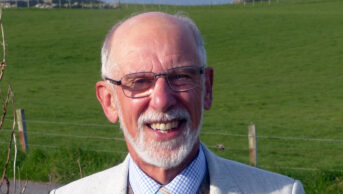With great sadness we learned of the passing of Peter Hylands, formerly head of the Institute of Pharmaceutical Science (IPS) at King’s College London (KCL).
Peter was an internationalist and pioneer in the field of natural product chemistry: one of the first to recognise the importance of nuclear magnetic resonance spectroscopy to the structural elucidation of natural products. He was a leader in the application of proteomics and metabolomics for quality assurance of medicines derived from natural sources.
Peter belonged to a rare breed. He was a man with a clear vision, able to create and grasp opportunities for the greater good, but he also understood what was needed to bring a vision to fruition. He was committed to the welfare of those who worked for him as well as his students.
Between 1970 and 2003, Peter enjoyed a successful career in both academia and the pharmaceutical industry. He returned to the pharmacy department at KCL in 2003, soon becoming head of department. He was central to the success of the department and, in 2011, co-created (alongside Clive Page) the IPS.
He focused research along the themes of drug discovery, medicines development and medicines use, securing a world leading reputation. Peter was committed to the education of others, taking a lead on how and what students were taught to ensure innovation was at the forefront of their learning. He understood the importance of developing students as clinicians and was instrumental in modernising the university’s clinical pharmacy teaching facilities. Securing the resource to rebuild this facility is a good example of his tenacity when arguing for critically important investment. Peter never took ‘no’ for an answer. In recognition of his efforts the new facility is named the Hylands Clinical Pharmacy Skills Suite.
Peter was wholly convinced of the value and potential of King’s Health Partners (KHP) and he contributed greatly to the establishment of the Pharmaceutical Sciences Clinical Academic Group (PSCAG) in 2009. Peter welcomed the contributions of his new NHS colleagues and did much to develop productive relationships. Peter was responsible in no small part for the success of the PSCAG and its standing both within and outside KHP.
Peter set high standards: leading by example, others followed and achieved what perhaps they thought beyond them. He went about life with a sense of purpose, using his sense of humour to good effect, possessing a good internal barometer of what was fair. His work ethic made him a highly respected and influential academic. He will be greatly missed.
We extend our condolences to his wife, Deborah, daughter Kate and son Jonty on their sad loss. A memorial service celebration of Peter’s life will be held on 9 October 2019 at the KCL Strand Chapel.
Vivian Auyeung, Graham Davies, Ben Forbes, Robert Hider, James Mason, Clive Page, David Taylor and John Weinman, Institute of Pharmaceutical Science, King’s College London; Gino Martini, chief scientist, Royal Pharmaceutical Society
You may also be interested in
